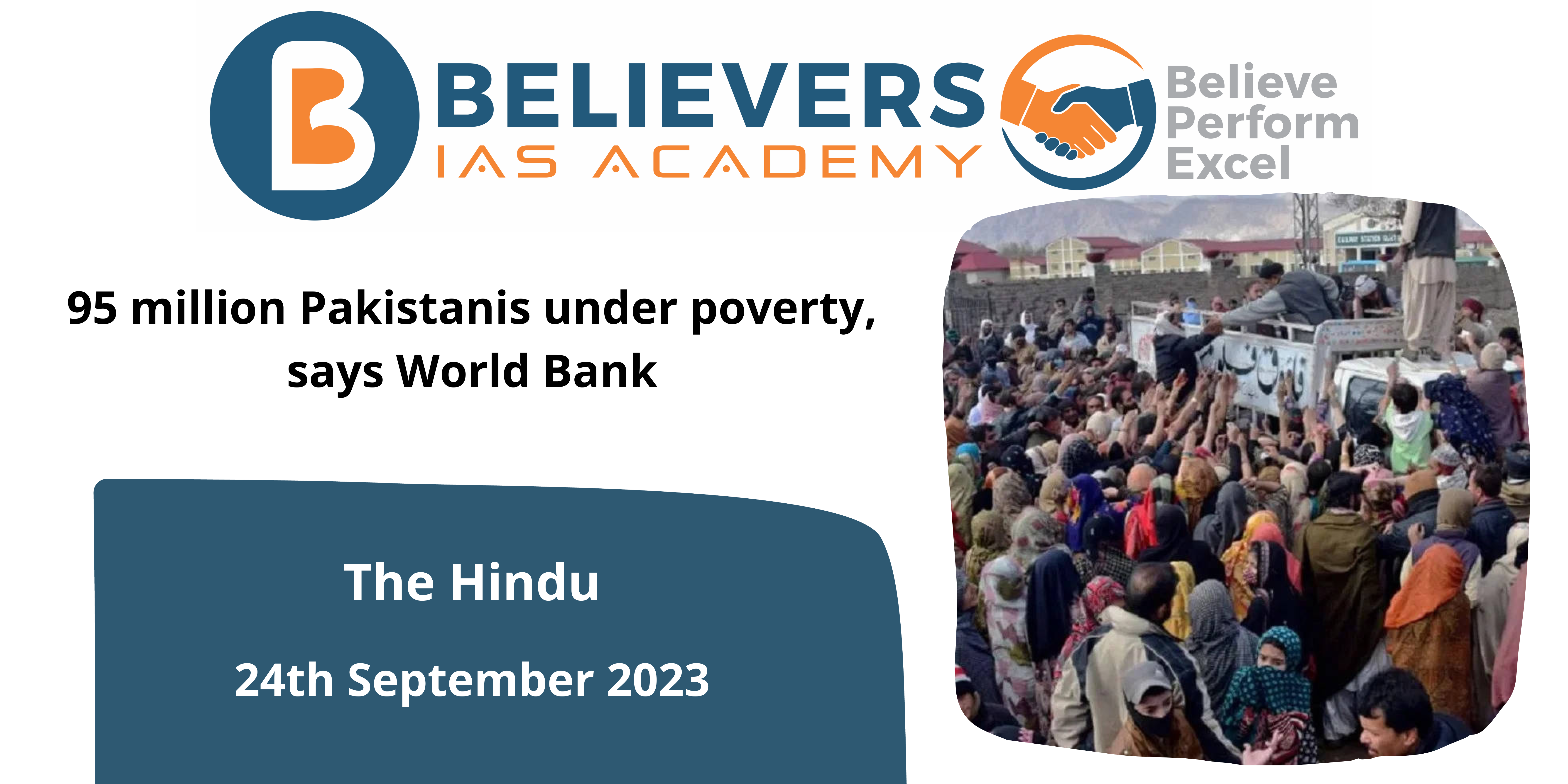95 million Pakistanis under poverty, says World Bank
Context
According to the World Bank, 12.5 million additional people fell into poverty in Pakistan over the previous fiscal year, pushing the country’s poverty rate to 39.4%. The World Bank encouraged Pakistan, which is struggling with its finances, to take immediate action to achieve financial stability.
What are the poverty statistics in Pakistan as per the World Bank?
- Increase in Poverty: In just one fiscal year, Pakistan’s rate of poverty rose sharply, from 34.2% to 39.4%.
- Additional People in Poverty: During this time, an estimated 12.5 million additional people were expected to be living below the poverty line, which is defined as $3.65 per day of income.
- Total Population in Poverty: Due to this rise, 95 million Pakistanis are now considered to be living in poverty.
What are the implications for India due to Poverty in Pakistan?
- Security Implications: Security Concerns: Social unrest may have security implications for India as a result of poverty and economic instability. It might result in more border disputes and tensions.
- Migration: Migration Flows: Especially among vulnerable groups, there may be an upsurge in migration from Pakistan to India in extremely poor conditions. For India, handling border security and providing humanitarian aid may present several difficulties.
- Geopolitical Relations: Relations between India and Pakistan may be impacted by the economic and political unrest in Pakistan. India can face diplomatic difficulties brought on by the unrest in its neighbour.
- Regional Development: South Asian regional cooperation projects like the South Asian Association for Regional Cooperation (SAARC) may be hampered by poverty in Pakistan. If Pakistan is unable to effectively contribute, cooperation and development in the area may be hampered.
- Terrorism and Extremism: Poverty and economic hardship can occasionally fuel the emergence of extreme beliefs and terrorism. Any increase in Pakistan’s instability may have an impact on regional security dynamics, notably those involving India.
What are the steps suggested by the World Bank to come out of poverty?
- Urgent measures: The World Bank urges that Pakistan must immediately take certain steps to address its economic problems and attain financial stability.
- Taxes of Important Sectors: The World Bank advises Pakistan to enact tax policies on two important industries, real estate and agriculture, which are frequently referred to as “sacred cows.” This implies that any tax exemptions or other special treatment that these industries may have received ought to be reviewed.
- Fiscal Adjustment: It is suggested that Pakistan make a significant fiscal adjustment that accounts for more than 7% of its GDP to achieve economic stability. This calls for considerable adjustments to taxation and spending by the government.
- Reduce Wasteful Government Spending: The specific fiscal adjustment will probably involve reducing wasteful government spending. This can mean cutting back on wasteful or ineffective spending across the board.
- Financial Stability’s Importance: Achieving financial stability is emphasized as a key objective. This is crucial for sustaining economic growth and bringing down the nation’s poverty rates.
- Draft Policy Notes: The World Bank has worked with all pertinent parties to develop draft policy notes. The future Pakistani administration, which is anticipated to assume office during the forthcoming election cycle, is the target audience for these notes. This suggests a team effort to tackle the economy’s problems.
Conclusion
The poverty in Pakisthan will impact negatively neighbouring countries like India and Afghanistan. The anti-social elements will cross borders in search of a better economy to exploit. In conclusion, the World Bank’s suggestions for Pakistan centre on boosting revenue from important industries, particularly agriculture and real estate, while simultaneously enacting significant fiscal changes to achieve financial stability. These actions are thought to be crucial in the fight against the nation’s rising poverty rates.



